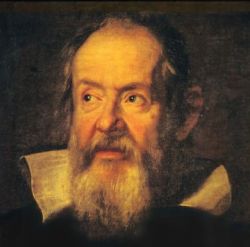Galileo Galilei |
Galileo. The name itself is likely to be immediately recognizable by most youth and adults today. It is often that he is the subject of science textbooks and even modern debates. Mitch Stokes' excellent biography is part of the Christian Encounters series which also includes his contribution on Isaac Newton. In this biography Stokes explores the controversial and misunderstood genius of Galileo Galilei.
In 1564 when Galileo was born. He was seemingly a young man who couldn't get his act together and struggled financially most of his adult life. The year he was born is the same year that witnessed the birth of Shakespeare and the deaths of John Calvin and Michaelangelo. He emerged from the Florentine tradition that produced such men as Machiavelli, Vespucci, and da Vinci. Galileo's father, Vicenzio Galilei, passed on to his son a Aristotelian view of things. Stokes also notes that "We can identify perhaps ten people in the world who held Copernicus' view between 1543 and 1600. It seems that Galileo was one of those ten." (pg 67)
Often Galileo is used as a hero of martyrdom. This was especially so during the Enlightenment era. Stokes suggests that portrait is historically inaccurate. In fact, Galileo states, "none...have spoken with more piety or with greater zeal for the Church than I."(pg. 3) Galileo was devout to his faith even until death. While mathematics was lacking in his time, his contention concerned the interpretation of Scriptures. His biggest mistake may have been his interaction with Pope Urban VIII whom, in his description of Galileo stated: "He did not fear to make sport of me." (pg. 165) Although some mistakenly think so that contention was never couched in a secular science versus religion debate.
In 1981 Pope John Paul II formed an interdisciplinary commission to investigate the nagging affair of Galileo. A long eleven years later, in 1992, the report materialized. The report summary is worth a thousand words:
"It is in the historical and cultural framework, far removed from our own times, the Galileo's judges, incapable of dissociating faith from age-old cosmology, believed, quite wrongly, that the adoption of the Copernican revolution, in fact not yet definitely proven, was such as to undermine Catholic tradition and that it was their duty to forbid its being taught. This subjective error of judgement, so clear to us today, led them to a disciplinary measure from which Galileo "had much to suffer." These mistakes must be frankly recognized, as you, Holy Father, have requested." (pg. 194)
Prior to his death men such as Thomas Hobbes and John Milton would visit Galileo. Ironically, Galileo died on January 8, 1642 the same year Isaac Newton was born on a small farm in England. Newton's work published in 1687, The Principia, would cause greater acceptance of the Copernican system for which Galileo was told could not exist. Indeed, ten years after Newton's death the body of Galileo was moved from a small room under a bell tower to a tomb, finally built, near Michaelangelo's and Machiavelli's tomb's in Saint Croce's basilica.
___
Disclosure of Material Connection: I received this book free from Thomas Nelson Publishers. I was not required to write a positive review. The opinions I have expressed are my own. I am disclosing this in accordance with the Federal Trade Commision's 16 CFR, Part 255: "Guides Concerning the Use of Endorsements and Testimonials in Advertising."


No comments:
Post a Comment